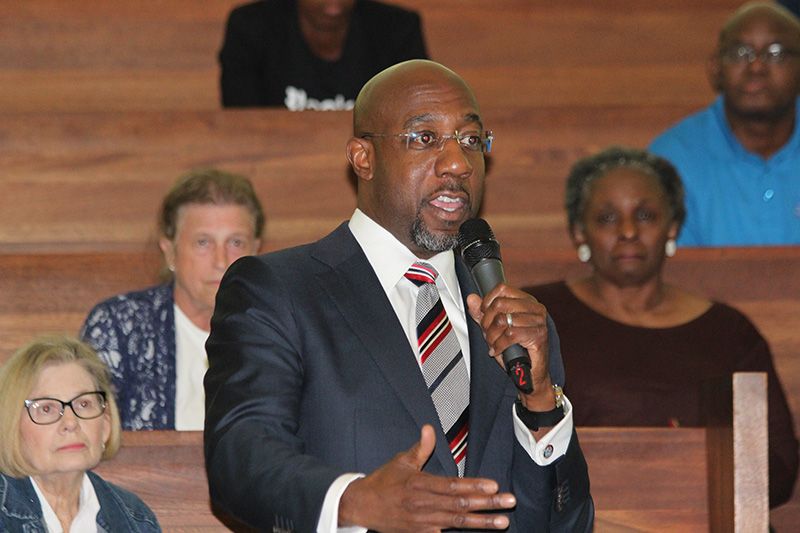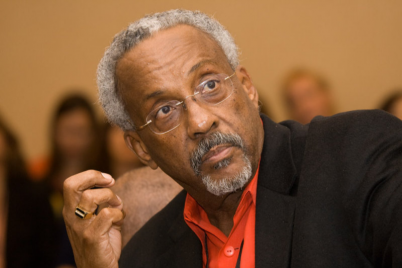Rev. Dr. Raphael Warnock visited Eckerd College (picture) in 2018 to inspire voters to pass Amendment 4, Voting Rights Restoration for Felons Initiative.
BY DEIRDRE O’LEARY, Staff Writer
NATIONWIDE — In an unusual set of circumstances, Georgia will hold two special Senate elections on Jan. 5, 2021. The first, a runoff between current Republican Senator David Purdue and Democratic challenger Jon Ossoff, was necessary because neither candidate received more than 50 percent of the vote on Nov. 3. Georgia law requires that the winner receive more than 50 percent of the vote.
The second is a special election to finish the term of a retired senator. Republican Senator Kelly Loeffler was appointed in Dec. 2019 by Georgia Gov. Brian Kemp when Senator Johnny Isakson resigned for health reasons. She is being challenged by Democrat Raphael Warnock, who has been the senior pastor of Ebenezer Baptist Church in Atlanta since 2005.
Because those two seats were not decided on Nov. 3, the incoming Senate has 48 controlled by Democrats and 50 by Republicans. If Democrats win both special elections, the parties will have the same number of senators, with Democratic Vice-President-elect Kamala Harris casting the tie-breaking vote.
The Democrats control the House of Representatives, but if they cannot win both Senate races, Republican Senator Mitch McConnell will likely attempt to block any initiatives that Biden brings, as he did with President Obama. With the stakes high, both parties are fighting hard to win.
In both Senate races, Georgia voters will have a choice between two very different candidates with contrasting values and priorities. Republican David Purdue, a businessman, has been senator since 2015. He is a close ally of outgoing President Trump and holds most of the same positions on issues.
Perdue does not believe in climate change and would like to eliminate the U.S. Environmental Protection Agency. He opposed the Affordable Care Act and voted to repeal it, co-sponsored legislation to reduce legal immigration by 50 percent over 10 years, and opposed same-sex marriage.
Democratic opponent Jon Ossoff, a former journalist, accepts the scientific consensus that climate change is real. He does not support the Green New Deal, however. Ossoff supports the Affordable Care Act, but not Medicare for All. He supports comprehensive immigration reform and abortion rights, and opposes prison sentencing for nonviolent drug offenses.
In the special election, Republican Kelly Loeffler will try to hold onto her seat. She previously was the CEO of a financial services firm owned by her husband. Loeffler is proud of her “100 percent Trump voting record” over the past year. She opposes the ACA and abortion rights and received an A rating from the National Rifle Association.
Democrat Raphael Warnock held various pastoral positions before taking over Rev. Martin Luther King’s former church. He was a leader in the campaign to expand Medicaid under the Affordable Care Act, making his name in Georgia politics. Warnock accepts the scientific consensus on the reality of climate change, supports prison reform, same-sex marriage and abortion rights.
According to the Georgia Secretary of State’s office, the state set records for increased voter turnout in both 2018 and 2020. No doubt this was due to the effort of Stacey Abrams’ advocacy group, Fair Fight, as well as many others.
Both Republican Senate candidates and Trump claimed, without evidence, that there was fraud in the Nov. 3 election and asked Secretary of State Brad Raffensperger, a Republican, to resign. Raffensperger defended the election but agreed to a recount, which did not change the results. Currently, the FBI is investigating threats made against election officials in Georgia.
Unlike the House of Representatives, where the number of Congressional members reflects the population, each state has two senators. As a result, mostly rural states get the same number of Senate votes as states with large urban populations.
The Senate is a somewhat elite body called the “upper chamber,” compared to the House, which is the “lower chamber.” Senators serve for six years, and there are no term limits. States typically stagger their senate elections to occur on different cycles.
In addition to passing legislation, the Senate can confirm presidential nominees, including cabinet members and Supreme Court Justices. The Senate’s presiding officer is the vice president of the United States, who can also cast a tie-breaking vote.
To reach Deirdre O’Leary, email do’leary@theweeklychallenger.com








